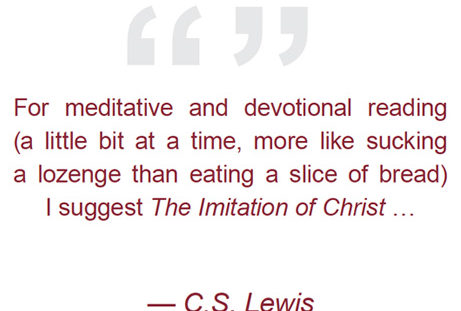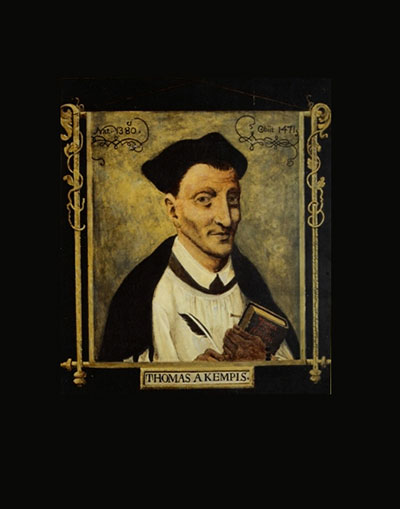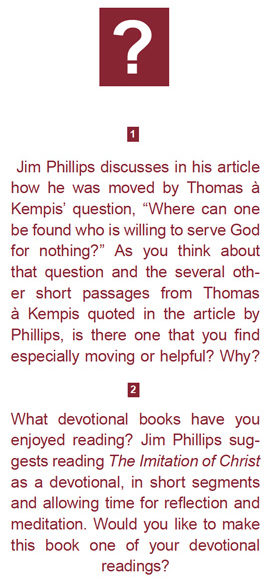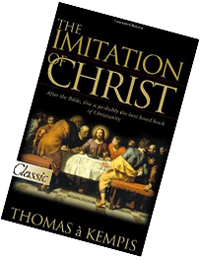Back to series
 True peace of heart, therefore, is gotten by resisting our passions, not by obeying them. There is no peace of heart of a carnal person, nor the person that is addicted to outward things, but there is peace in the heart of a spiritual and devout person.3
True peace of heart, therefore, is gotten by resisting our passions, not by obeying them. There is no peace of heart of a carnal person, nor the person that is addicted to outward things, but there is peace in the heart of a spiritual and devout person.3
 5And we are still in Book 1 of four!
5And we are still in Book 1 of four!
It has been said that Thomas used or alluded to more than a thousand Scriptures. Often his words read like the Proverbs. His work therefore should not be read like a novel, but in short segments, allowing time for reflection and meditation. I have used The Imitation of Christ as a devotional, reading only short passages at each sitting. I’ve discovered that with every new read, the Spirit brings new things to my mind that I need to consider to be a better follower of Jesus.
 There are a number of translations available for this classic. I found the Pure Gold Classic version by Harold J. Chadwick (Bridge-Logos Publishers, 1999) to be excellent. This version includes the notes and Scripture references at the end of each chapter. Kempis, being Roman Catholic, occasionally makes reference to doctrines of the Catholic Church that are contrary to Protestant views. But most of the material is about becoming like Christ, and the Pure Gold Classic version focuses on translating these passages so they are relevant to all Christians regardless of specific doctrines. Chadwick says: “It is doubtful if there is any great Christian leader, past or present, Roman Catholic or Protestant, who has not read The Imitation of Christ.”
There are a number of translations available for this classic. I found the Pure Gold Classic version by Harold J. Chadwick (Bridge-Logos Publishers, 1999) to be excellent. This version includes the notes and Scripture references at the end of each chapter. Kempis, being Roman Catholic, occasionally makes reference to doctrines of the Catholic Church that are contrary to Protestant views. But most of the material is about becoming like Christ, and the Pure Gold Classic version focuses on translating these passages so they are relevant to all Christians regardless of specific doctrines. Chadwick says: “It is doubtful if there is any great Christian leader, past or present, Roman Catholic or Protestant, who has not read The Imitation of Christ.”


Recommended Reading:

The Imitation of Christ
Click here to open a Print - Friendly PDF
 The idea that thoughts, books, science of an earlier time is inherently inferior to that of the present just because it is “older” was dubbed “chronological snobbery” by C.S. Lewis and Owen Barfield. In fact, when it comes to books, Lewis said that a good rule of thumb was that for every new book we read, we should purposely engage in reading an old book.
The idea that thoughts, books, science of an earlier time is inherently inferior to that of the present just because it is “older” was dubbed “chronological snobbery” by C.S. Lewis and Owen Barfield. In fact, when it comes to books, Lewis said that a good rule of thumb was that for every new book we read, we should purposely engage in reading an old book.
I want to encourage you to step back into the early 1400s and consider reading a Christian classic. Before there was Oswald Chambers (My Utmost for His Highest) or other noted devotional writers, a disciple longing to follow Jesus would read The Imitation of Christ by Thomas à Kempis. Thomas was a German-Dutch monk writing to other monks in pre-Reformation times. He wrote The Imitation of Christ between 1420 and 1427 with the first hand-written manuscripts appearing around 1427. By 1779 there were at least 1,800 editions and translations. John Wesley translated a version in the 1700s.
If you like Oswald Chambers’s ability to capture profound truths in compact statements, consider these statements by Thomas:
We are all frail, but you should think of no one being frailer than yourself.1
If you desire to benefit from the Scriptures, read with humility, simplicity, and faithfulness – never desire to become known as a Bible scholar.2
 True peace of heart, therefore, is gotten by resisting our passions, not by obeying them. There is no peace of heart of a carnal person, nor the person that is addicted to outward things, but there is peace in the heart of a spiritual and devout person.3
True peace of heart, therefore, is gotten by resisting our passions, not by obeying them. There is no peace of heart of a carnal person, nor the person that is addicted to outward things, but there is peace in the heart of a spiritual and devout person.3
Yet we must be watchful, especially in the beginning of temptation, for the enemy is more easily overcome in the beginning if he is not allowed to enter the door or our hearts, but is resisted outside the gate, at his first knock. When he is not resisted, little by little, he gets complete entrance.4
The more time you spend in your secret place, the more you will like it, and the less time you spend there the more you will loath it.
 5And we are still in Book 1 of four!
5And we are still in Book 1 of four!It has been said that Thomas used or alluded to more than a thousand Scriptures. Often his words read like the Proverbs. His work therefore should not be read like a novel, but in short segments, allowing time for reflection and meditation. I have used The Imitation of Christ as a devotional, reading only short passages at each sitting. I’ve discovered that with every new read, the Spirit brings new things to my mind that I need to consider to be a better follower of Jesus.
For example: Do you remember Satan’s question of God concerning Job: “Does Job fear God for nothing?” (Job 1:9). His charge was straightforward: “Look at all the blessings you have given Job, what man or woman would not serve You given this level of rewards?” (my paraphrase).
Having read this passage many times, I never asked myself the question: “Do I serve God for His blessings?” But then I read Kempis: “Where can one be found who is willing to serve God for nothing?” I had to stop and take stock of my attitude toward God. Do I serve Him and love Him for who He is, or for what He has promised me? I did not like the answer that crawled up from the slimy abyss known as my fallen nature. Thank you, Thomas, for pointing out to me the need to love God for Himself, for who He is, for what He has done, for loving me first, expecting nothing in return.
 There are a number of translations available for this classic. I found the Pure Gold Classic version by Harold J. Chadwick (Bridge-Logos Publishers, 1999) to be excellent. This version includes the notes and Scripture references at the end of each chapter. Kempis, being Roman Catholic, occasionally makes reference to doctrines of the Catholic Church that are contrary to Protestant views. But most of the material is about becoming like Christ, and the Pure Gold Classic version focuses on translating these passages so they are relevant to all Christians regardless of specific doctrines. Chadwick says: “It is doubtful if there is any great Christian leader, past or present, Roman Catholic or Protestant, who has not read The Imitation of Christ.”
There are a number of translations available for this classic. I found the Pure Gold Classic version by Harold J. Chadwick (Bridge-Logos Publishers, 1999) to be excellent. This version includes the notes and Scripture references at the end of each chapter. Kempis, being Roman Catholic, occasionally makes reference to doctrines of the Catholic Church that are contrary to Protestant views. But most of the material is about becoming like Christ, and the Pure Gold Classic version focuses on translating these passages so they are relevant to all Christians regardless of specific doctrines. Chadwick says: “It is doubtful if there is any great Christian leader, past or present, Roman Catholic or Protestant, who has not read The Imitation of Christ.”
Remember, The Imitation of Christ is not Scripture, just as My Utmost for His Highest is not. But because of the heart of these writers, and their commitment to be true to Scripture’s teachings, we can benefit from commentary and teaching that reflect the gift of wisdom that was given each for his or her day and time – wisdom that is relevant to all people, for all time, without chronological bias.
Put the new books aside, pick up a classic, and experience the timelessness of Scripture’s wisdom in the writing of Thomas à Kempis, The Imitation of Christ.
|
Notes: |

Jim Phillips
CSLI Teaching FellowJim Phillips, Teaching Fellow, graduated from the U.S. Naval Academy in 1975. Following six years as a Navy pilot, Jim began an 18-year career with IBM. In 1999, Jim accepted a position with CAI Incorporated as a Division General Manager responsible for commercial business across a four-state geography. Jim is also a teaching Fellow of the Annapolis Extension of the C.S. Lewis Institute. He received a Master of Arts from Saint John’s College in 2019 and a Post Graduate Diploma in Theology and Religion from Oxford University in 2020 and is currently pursuing doctoral studies at the University of Oxford and The Oxford Centre for Mission Studies/Middlesex University at the Oxford Campus.

Recommended Reading:
Thomas à Kempis, The Imitation of Christ, edited by Harold J. Chadwick (Bridge-Logos Publishers, revised edition, 1999)
For five centuries, it’s been one of the best–loved books of Christianity. This updated edition features 1,000 end–of–chapter Scripture references and notes, a section of devotional excerpts, and a topical index. Sensitively updated language makes this spiritual classic even more accessible to contemporary readers. For all seekers desiring an intimate knowledge of Christ.
 COPYRIGHT: This publication is published by C.S. Lewis Institute; 8001 Braddock Road, Suite 301; Springfield, VA 22151. Portions of the publication may be reproduced for noncommercial, local church or ministry use without prior permission. Electronic copies of the PDF files may be duplicated and transmitted via e-mail for personal and church use. Articles may not be modified without prior written permission of the Institute. For questions, contact the Institute: 703.914.5602 or email us.
COPYRIGHT: This publication is published by C.S. Lewis Institute; 8001 Braddock Road, Suite 301; Springfield, VA 22151. Portions of the publication may be reproduced for noncommercial, local church or ministry use without prior permission. Electronic copies of the PDF files may be duplicated and transmitted via e-mail for personal and church use. Articles may not be modified without prior written permission of the Institute. For questions, contact the Institute: 703.914.5602 or email us.
-
Recent Podcasts
Questions That Matter Podcast – Samuel James and Digital Liturgies
by Samuel James on April 19, 2024Digital technologies, the internet, Facebook, and many other...Read More
-
The Side B Stories – Dr. James Tour’s story
by Jana Harmon, James Tour on April 12, 2024
-
Why are Christians so Bad?
by Paul Joen on April 5, 2024
-
Recent Publications
Isn’t Morality Relative?
by Christopher L. Reese on April 1, 2024It is widely accepted in the Western world...Read More
-
Do Muslims and Christians Worship the Same God?
by Andy Bannister on March 1, 2024
-
Artificial Intelligence and Its Impacts on Humanity
by John Lennox on February 13, 2024
0
All Booked
0.00
All Booked
0.00
All Booked
20599
GLOBAL EVENT: 2024 Study Tour of C.S. Lewis’s Belfast & Oxford
https://www.cslewisinstitute.org/?event=global-event-2023-study-tour-of-c-s-lewis-belfast-oxford-2&event_date=2024-06-22®=1
https://www.paypal.com/cgi-bin/webscr
2024-06-22

Next coming event
Days
Hours
Minutes
Seconds
GLOBAL EVENT: 2024 Study Tour of C.S. Lewis’s Belfast & Oxford
On June 22, 2024 at 12:00 pmat Belfast, Northern Ireland & Oxford, EnglandSpeakers

Jim Phillips
CSLI Teaching Fellow
Team Members

Jim Phillips
CSLI Teaching FellowJim Phillips, Teaching Fellow, graduated from the U.S. Naval Academy in 1975. Following six years as a Navy pilot, Jim began an 18-year career with IBM. In 1999, Jim accepted a position with CAI Incorporated as a Division General Manager responsible for commercial business across a four-state geography. Jim is also a teaching Fellow of the Annapolis Extension of the C.S. Lewis Institute. He received a Master of Arts from Saint John’s College in 2019 and a Post Graduate Diploma in Theology and Religion from Oxford University in 2020 and is currently pursuing doctoral studies at the University of Oxford and The Oxford Centre for Mission Studies/Middlesex University at the Oxford Campus.





